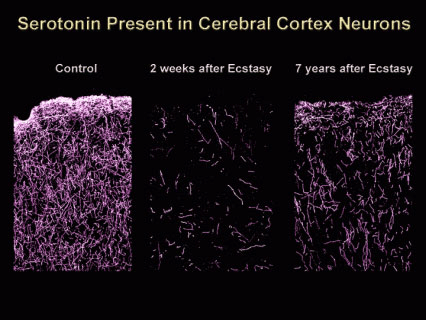What does MDMA do to the pineal gland?
MDMA can cause a massive release—and eventual depletion—of serotonin in many brain regions, particularly those that have robust serotonin reuptake systems. However, studies in rats have shown that the pineal gland is surprisingly resistant to this effect. In other words, while MDMA depletes serotonin in areas like the cortex and striatum, it does not significantly change the serotonin levels in the pineal gland. This resistance is thought to be because the pineal gland lacks the serotonin reuptake transporter that MDMA targets to induce neurotoxicity.
This means that, unlike other parts of the brain, the pineal gland isn’t directly affected by MDMA’s toxic action on serotonin neurons.

Alright, let’s dive into this! MDMA, or 3,4-methylenedioxymethamphetamine, is a synthetic drug known for its stimulant and empathogenic effects—think ecstasy or molly. The pineal gland, a tiny pea-sized structure in the brain, is famous for producing melatonin, which regulates sleep-wake cycles, and has been speculatively linked to mystical experiences (thanks to chatter about DMT, though that’s unproven in humans). So, what happens when MDMA meets the pineal gland?
There’s no direct, conclusive scientific evidence that MDMA specifically targets or alters the pineal gland’s function in a unique way. Most research on MDMA focuses on its effects on neurotransmitters like serotonin, dopamine, and norepinephrine in regions like the prefrontal cortex, amygdala, and hypothalamus—not the pineal gland itself. MDMA works by causing a massive release of serotonin from neuron storage sites, blocking its reuptake, and boosting feelings of euphoria, empathy, and energy. The pineal gland isn’t a major player in this serotonin story, as its primary gig is melatonin, not serotonin processing.
That said, there’s some indirect speculation we can explore. The pineal gland does have serotonin receptors, and since MDMA floods the brain with serotonin, it’s plausible that this could subtly influence pineal activity. Some researchers suggest that serotonin spikes might affect melatonin production, but studies are mixed. For instance, a 1996 study on rats (not humans) found that MDMA could slightly alter melatonin levels in the blood, possibly via serotonin pathways—but this wasn’t tied directly to the pineal gland’s function, and human data is sparse. Sleep disruption is a well-known MDMA side effect, and since the pineal gland regulates sleep via melatonin, there might be a downstream connection. Users often report messed-up sleep after a dose, which could hint at temporary pineal interference, but it’s not like MDMA is frying the gland itself.
On the flip side, wilder claims—like MDMA “activating” the pineal gland to produce DMT or unlock spiritual states—float around in psychedelic circles. There’s zero hard evidence for this. DMT synthesis in the human pineal gland remains a hypothesis, not a fact, and MDMA’s mechanism doesn’t align with DMT production pathways. These ideas seem more like lore than science.
So, bottom line: MDMA likely doesn’t do anything dramatic or specific to the pineal gland directly. Its effects are more about serotonin overload across the brain, with possible secondary ripples (like sleep changes) that might nudge pineal output indirectly.
In the short term MDMA activates the pineal gland, but overuse of MDMA does it more harm than good.